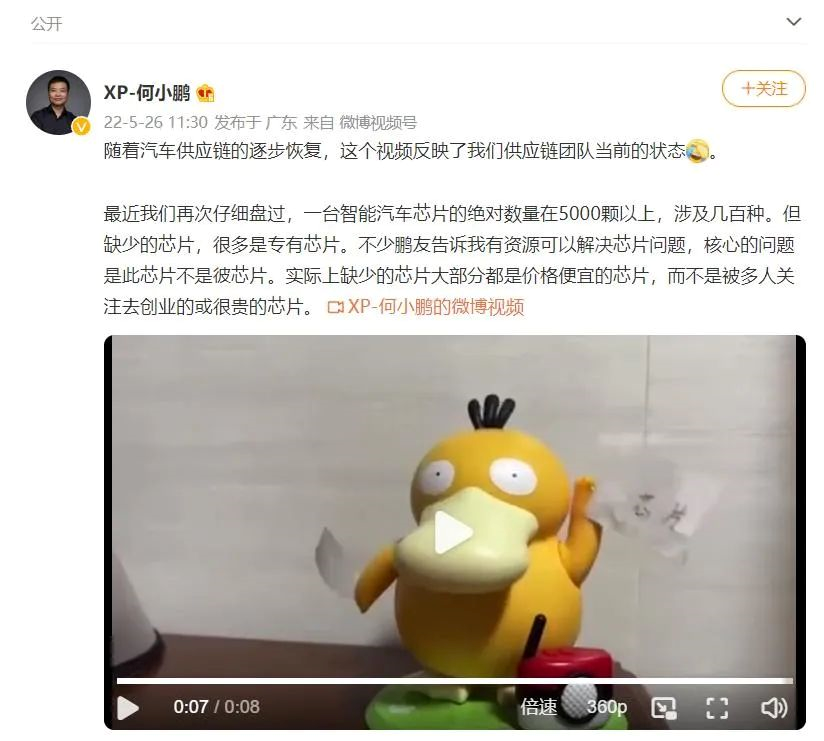Article | Leng Zelin
Editor | Wang Pan
Today, He XPeng, CEO of XPeng Motors, released a video on social media. In the video, the hottest cartoon character Psyduck is shown with its left hand saying “in urgent need” and its right hand saying “of chips”, which means “in urgent need of chips” when combined.
He XPeng said in the post, “With the gradual recovery of the automobile supply chain, this video reflects the current state of our supply chain team.”

Starting from May 21st, purchasing the Children’s Day combo meal at KFC will get you a blind box of music toys, including cartoon characters such as Psyduck and Pikachu. With its infectious dancing and catchy music, Psyduck has become a hit on various social media platforms in just a few days.
Similarly, with the frenzy of purchases, many KFC stores have run out of Psyduck toys. If you want to have your own Psyduck, the only way is to buy it on the second-hand market, with prices ranging from tens to hundreds of yuan, and some even up to thousands of yuan.
This situation seems to be very similar to the shortage of automotive chips. Yu Chengdong, CEO of Huawei’s Intelligent Automotive Solutions Business Unit, said in April that a chip that was originally priced at 10-20 yuan on the market is now selling for 2500 yuan, and a car requires nine such chips.
Roughly calculated, not considering the price increase of batteries and other raw materials, just this type of chip will increase the cost of a single vehicle by 20,000 yuan.
It’s no wonder that He XPeng complained about “chip shortage” again this month. In the first quarter earnings call a few days ago, He XPeng said that the challenge of the chip supply chain may be longer than everyone imagined.
Also during the earnings call, He XPeng proposed three solutions that XPeng Motors is currently implementing to alleviate the chip shortage, including long-term cooperation with suppliers, building a strong embedded chip team, and making technical adjustments to the vehicles according to changes in chips.
In fact, we have seen some solutions implemented in the past year, such as XPeng Motors’ strategic cooperation with Qualcomm Technologies last year, and its exclusive strategic investment in Shanghai Zhanxin Electronics Technology Co., Ltd., a domestic provider of silicon carbide power semiconductor and chip solutions, earlier this year.
However, “automotive chip” is an ambiguous concept, including MCU, ASIC, power semiconductors, sensors and other types of chips. In the above-mentioned cooperation and investment by XPeng Motors, the former mainly targets the digital cockpit platform, and the cabin chips that control the central control screen, such as the commonly used Qualcomm 8155, while the latter aims at SiC silicon carbide chips, which are power semiconductor devices mainly used in electric drive systems and inverters.And He XPeng also mentioned in the article that the number of chips in smart cars is definitely more than 5,000, involving hundreds of types, and most of the missing chips are cheap ones, not the ones that attract much attention.
This means that even if the original equipment manufacturers try their best, they can only alleviate the situation of some core chips at most, but cannot solve the problem that affects the entire industry.
In the “Dialogue·Challenger” program broadcasted on December 25th last year, when asked about the most anxious thing, He XPeng answered, “Whoever gives me chips, I invite him to drink.”
Even to get the chips, He XPeng and his team will fly to drink. And this situation is actually very common in the automotive industry. In an interview earlier this year, Li Bin, CEO of NIO, also told Photon Motorcade that even if he is not good at drinking, he has to seek support from partners.
According to the latest data from AutoForecast Solutions, as of May 8th, due to the chip shortage, the global automobile market has reduced its output by approximately 1.6938 million vehicles this year. Among them, Europe is the most severely affected, accounting for 46% of the total reduction, while the domestic market accounts for about 5.4%.
How long will this situation continue? Perhaps no one can give a specific answer. In the first quarter earnings conference in 2021, He XPeng believed that the chip shortage problem may be delayed until the first quarter of 2022 at the latest, but in this year’s first quarter earnings conference, He XPeng extended this time to even longer, even into next year.
In addition, factors such as rising battery prices and production stoppages due to epidemics are also slowing down the delivery of vehicles. If you have a plan to purchase a car this year, it is essential to be prepared for delayed delivery or to install accessories after delivery.
Photon Motorcade has summarized the delivery cycles of some mainstream models for reference. The Model 3 rear-wheel drive/dual motors are 20-24 weeks and 16-20 weeks respectively, the XPeng P7/P5 are 10-16 weeks, the G3i is 8-9 weeks, and the Ideal ONE is relatively short, around 6-8 weeks.
This article is a translation by ChatGPT of a Chinese report from 42HOW. If you have any questions about it, please email bd@42how.com.
